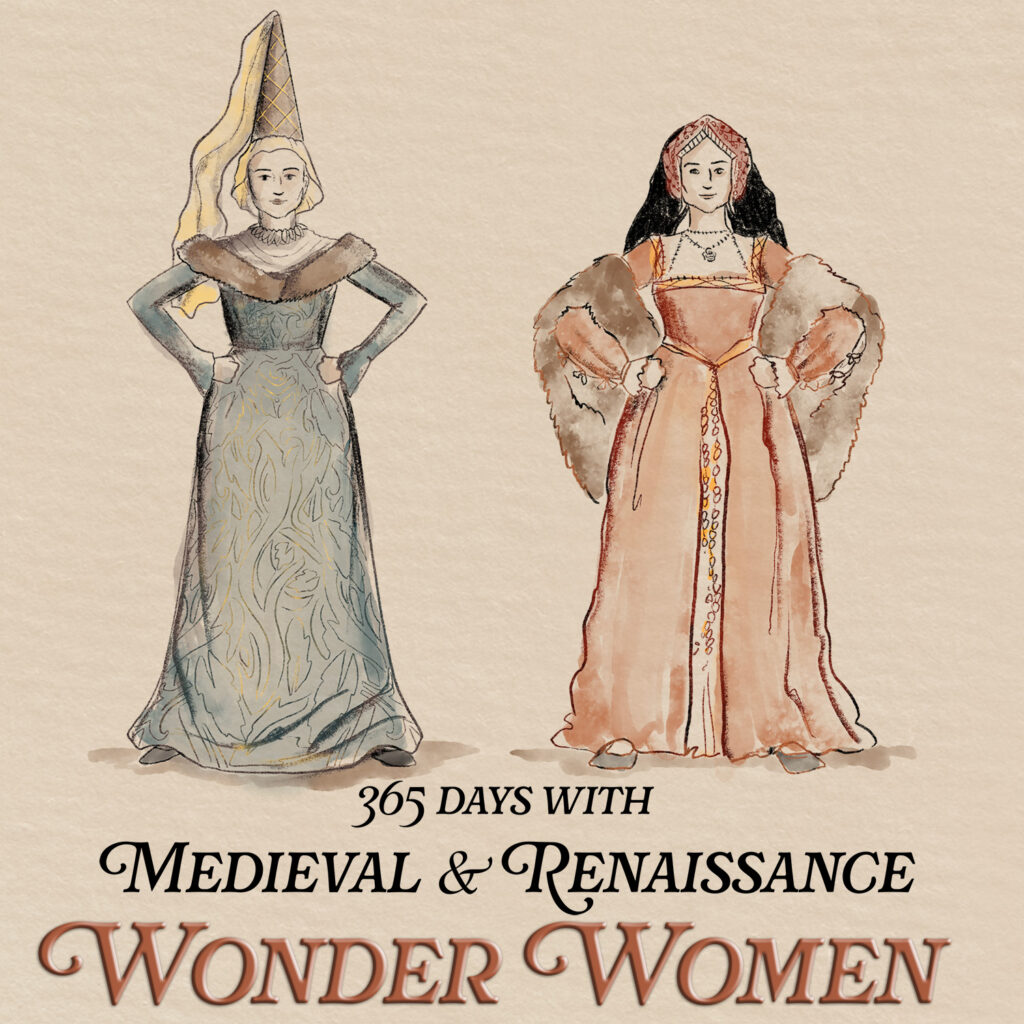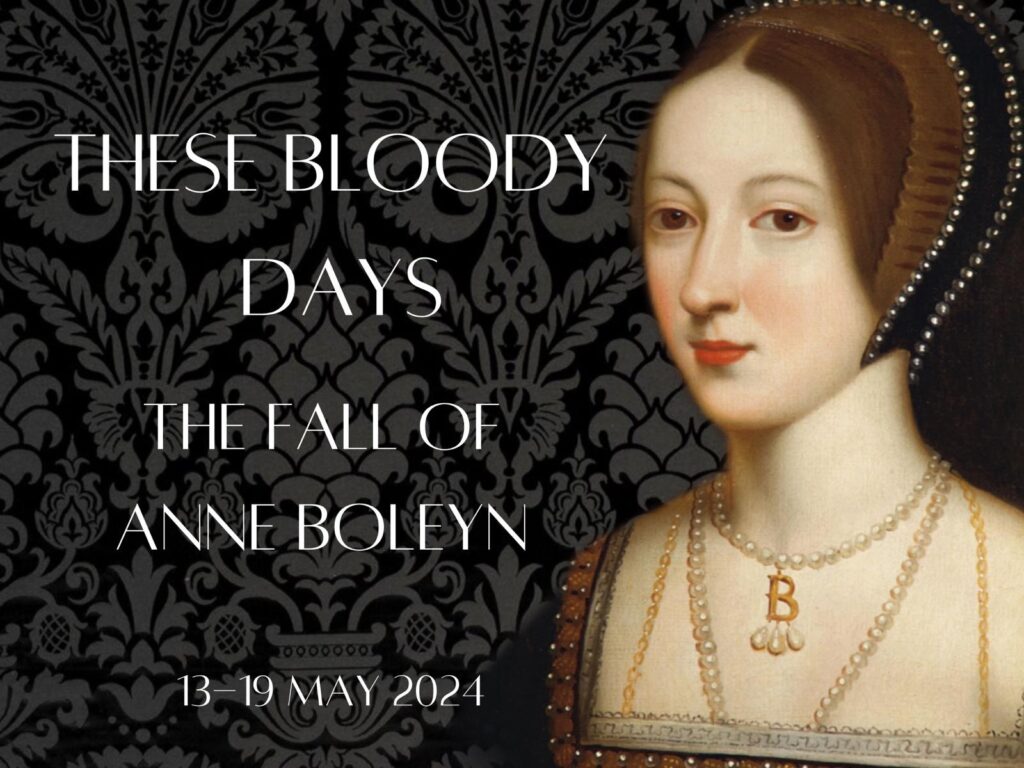Why do you think that almost 500 years after Anne Boleyn’s death she still provokes such strong feelings and emotions? Why does she polarize people?
Anne Boleyn was an extraordinary woman who polarised opinions even in her day. Sources written by people who knew Anne make that clear. For example William Latymer, her chaplain, depicted her as a Protestant saint and this was also the picture given to George Wyatt through his family papers and his discussions with people that had known Anne. For Eustace Chapuys, the Imperial Ambassador however, Anne was always the ‘other woman’. In his writings he could not even bring himself to refer to her by name and he remained convinced that she intended to murder both Catherine of Aragon and Princess Mary.
So Anne has always been a controversial figure. This continued into the reign of her daughter, with Elizabethan writers either extolling her virtues or denigrating her memory, depending on their own opinions of her daughter and her policies. Even today, Henry VIII’s Great Matter is often seen as a competition between Catherine and Anne, with people taking sides.
To go from being the daughter of a minor noble family to becoming a queen was highly unusual. In the sixteenth century the only recent precedent had been Elizabeth Woodville, whose marriage appears to have been a spur of the moment decision by Edward IV. Anne and Henry on the other hand faced many more obstacles to actually marry and Anne emerged, for a period, as one of the king’s chief ministers and very much a politician in her own right. This was a remarkable achievement and one that was not followed by any of Henry’s later wives (with even Catherine Parr finding it difficult to assert herself politically).
I think there are many reasons why Anne still provokes such strong feelings and emotions. There is the passionate love affair between Anne and Henry that fires the imagination. There is her strength of character and also the minute details of her life which are often not known for an earlier historical woman. Finally there is the terrible nature of her death and the injustice she suffered. Anne Boleyn was a woman who knew what she wanted and went for it at any cost but, ultimately, the cost to her was shocking.
You have written books about Anne Boleyn, Jane Seymour, Anne of Cleves and Catherine Parr. What makes these women such interesting subjects?
As a group the six wives of Henry VIII assert a fascination due both to the fact that no other king had so many wives (the previous highest English total being the three wives of Kings Edward the Elder and Edgar respectively). Henry also subverted tradition by marrying four Englishwomen, something that was almost unheard of in the sixteenth century. Rather than marrying for policy and then taking a mistress, Henry effectively married the women who would have become his mistresses. It appears that Jane Seymour was, at first, intent on becoming a royal mistress before she set her sights higher. There are also rumours that Catherine Parr attempted to refuse the king, offering to become his mistress instead. Anne of Cleves’ own marriage, whilst at first more conventional, also completely subverted accepted tradition with Henry’s rejection of her.
Whilst as a group Henry’s six wives are fascinating they were also interesting as individuals. Anne Boleyn, as I set out above, was one of the most remarkable women of her age. Catherine Parr, with her strong religious faith and her belief that she had been divinely called to queenship is also fascinating both as a queen and as a woman who finally found love, only to be betrayed. Anne of Cleves is often portrayed as a comical figure but, in reality, she had her own hopes and ambitions. Her struggle to provide for herself and live independently following her divorce shows her remarkable spirit in an age when, as an unmarried woman with no male protector, she was very much an oddity. Finally, Jane Seymour, who must be considered the most enigmatic of Henry’s queens, was a woman with her own hopes and ambitions. Opinion of Jane’s reputation, due to her role in the execution of Anne Boleyn is almost as polarised as her predecessors. However, as a woman in her late twenties, rapidly approaching spinsterhood, the opportunity of marriage to the king must have been dazzling. With Jane, as with many of Henry’s other wives, there is a pathos to her story: there are hints that had she lived to rule as regent for her son she may have shown her true ability.
Who is your favourite of Henry’s Queens and why?
This is a difficult question. I tend to think of Henry VIII’s wives in terms of major and minor wives. Catherine of Aragon, Anne Boleyn and Catherine Parr were major figures in their own right (although, as I touched upon above, Catherine Parr’s political ambitions were somewhat curtailed by Henry). Jane Seymour, Anne of Cleves and Catherine Howard on the other hand left little (if any) appreciable political legacy.
The most fascinating of Henry’s wives is Anne Boleyn but she is not my favourite – if she was alive today I am not sure we would have been friends! I was surprised by how much I came to like Jane Seymour when I was researching her. I found her a stronger and kinder character than I had thought. I think my favourite as an individual would have to be Anne of Cleves. She dealt with the difficult circumstances of her marriage with dignity and was then able to build a life for herself in a strange country where she did not even (at first) speak the language. Anne comes across as a kindly and dignified figure and one that it was easy to warm to, as many of her contemporaries also found.
Do you think that Anne Boleyn and Thomas Wyatt were once romantically involved?
I think the evidence for Anne and Wyatt having some kind of relationship is overwhelming. Wyatt’s grandson, George Wyatt, was certain that they had, as were other (less favourable) sixteenth century writers, suggesting that it was common knowledge. The evidence of Wyatt’s poems is also strong: the poem concerning the deer hunt clearly refers to Anne, as do references to ‘Brunet’. Finally, Wyatt’s imprisonment at the time of Anne’s arrest is also telling.
Whilst I do think that Anne and Wyatt had some sort of a relationship, I think it is very unlikely that this was actually consummated. Wyatt was a married man and could offer Anne no future. Anne’s relationships with Henry Percy and then the king demonstrate that she was ambitious and it is very unlikely that she would have risked her future for a love affair with a married man (she held off Henry VIII after all…). I think Wyatt was an admirer that Anne was attracted to. The pair flirted and indulged in some of the rituals of courtly love, but I do not think that it went any further than that.
There are many public misconceptions about Henry VIII and his Queens. In your opinion, what is one of the worst?
The eight wives of Henry VIII maybe…
Seriously though, I think the belief that Henry sacrificed Jane Seymour for the sake of their son (with it commonly assumed that she was forced to undergo a caesarian section). Henry VIII was, in many respects, a very poor husband, but he was genuinely concerned at Jane’s illness and grieved by her death. There is no doubt that his son was some consolation but I do think that Henry was genuinely saddened by her death. For Jane to have survived Edward’s birth by nearly two weeks is clear proof that she gave birth naturally. A woman undergoing a caesarian in the early sixteenth century would have died immediately.
What do you think was Cromwell’s role in Anne’s downfall?
I think that Cromwell was deeply involved in the conspiracy against Anne. The pair quarreled a few weeks before Anne’s death and she told him that she would have his head. This caused Cromwell to throw his weight behind Jane Seymour and the Imperial faction, something that was not a natural pairing. Chapuys’ account of his meeting with Cromwell when the minister made it clear that he was working against Anne is telling.
However, I do think that, ultimately, it is Henry that must be considered responsible for Anne’s death. At best all the evidence against her pointed to was flirtation, something that Henry must have been aware of. Cromwell, the Seymours and Princess Mary’s supporters could not have actually brought down the queen without Henry’s approval. Henry VIII was no fool and it is very unlikely that he believed the evidence against Anne – he simply wanted a pretext to allow him to rid himself of a wife of whom he was tired and marry a new love.
Do you think that the English people would have grown to love Anne and seen her as their rightful Queen if in January 1536 she had delivered of a healthy son and heir?
By 1536 nearly everyone in England was desperate for Henry to have a son. The fear was that, with a disputed succession, the country would return to the civil war which had dogged the second half of the fifteenth century. I think that, in the main, there would have been rejoicing if Anne had given birth to a healthy son in January 1536. Anne’s son would always have his legitimacy questioned – as Elizabeth did. It is likely that, in 1547 the supporters of Princess Mary would have queried Anne’s son’s right to the throne, as would the French using their claimant Mary, Queen of Scots. However, I think that most people would have been happy to accept a son of Henry VIII (as they later accepted both his daughters) even though his legitimacy was debateable. As the years passed (and with, perhaps, more children being added to the royal nursery) I think that people would have begun to accept Anne as queen, particularly with the death of Catherine of Aragon. Even the Emperor Charles V was prepared to recognise Anne as queen in April 1536 when Chapuys finally acknowledged her.
Anne and Henry’s son would have been eleven at the time of Henry’s death. Anne is very likely to have been his regent. I think that people would have accepted that. Whether people would have grown to love her or not, I’m not sure. Anne had a very strong character and made many enemies. She was also loved by many and, if she had begun to implement some of her daughter’s later policies, she may have become popular.
Henry VIII is often spoken of as having undergone a drastic change in personality in his late thirties and early forties. The label ‘virtuous prince’ is often used to describe his early years and ‘tyrant’ or ‘monster’ are terms usually associated with Henry in the latter half of his reign. Do you believe that he did in fact undergo a transformation in personality or do you think he was always capable of being the ‘tyrant’?
I think that Henry always had the capability to become a tyrant. The execution of the Duke of Buckingham early in his reign and his estrangement from Princess Mary during the divorce show an unattractive side to his character. Unlike Prince Arthur, Henry was raised by his mother with his sisters. It appears that he was something of the star of the family group, as Erasmus’ account of a meeting with the young Henry shows. Following Arthur’s death and the death of his mother, Henry passed into the hands of his overprotective father. He spent a cosseted childhood being told how wonderful he was. This continued on his accession with the praise heaped on him as the most handsome and intelligent prince in Europe. He was an egotist, determined upon his own pleasure and needs at any cost. Whilst this was forgivable in a young and handsome prince, with the years of bitterness at his failure to beget a healthy son and the long wait to marry Anne, as well as his increasing physical unattractiveness, it became more apparent. Henry VIII always believed that he was right and that his actions were justifiable: something that could lead to tyranny.
I am sure that you have visited many locations with Tudor connections. Do you have a favourite?
I live very close to Hampton Court and so I would have to say there. It is a lovely place to visit. The royal apartments also resonate with the history of Henry VIII’s reign and all of the last five wives of Henry VIII have some level of association with it. The gardens and later additions by William III are also fascinating.
Could you tell us a little about your new book ‘Anne Boleyn: In Her Own Words & the Words of Those Who Knew Her’?
This is a source book that I have edited. Apart from an introduction briefly setting out the facts of Anne’s life and short introduction to each of the sources, I have tried to let the documents speak for themselves. The aim was to tell the story of Anne’s life only through the original documents. They are a real mixture: all Anne’s known letters and the poems attributed to her, for example, as well as Henry VIII’s love letters, Chapuys’ despatches, George Constantyne’s Memorial, George Wyatt’s Life of Anne and extracts from Cavendish’s Life of Wolsey. All of the sources have been published before, but many are very hard to find. I wanted to put the most important material for Anne’s life together for the first time so that readers can see it for themselves.
What is one of your favourite Tudor moments or quotes?
There are so many, it is hard to choose! When I was researching my book on Anne of Cleves I found Henry’s attempts to find a new bride particularly fascinating. Whilst it is probable that Christina of Denmark never actually said that ‘she had but one head, if she had two, one should be at his Majesty’s service’. But it is certain that Henry asked for all the eligible ladies of the French court to be brought to Calais, a scandalous proposition to which the French ambassador responded sarcastically by asking Henry whether he also wanted to try out the ladies before he made his choice.
Alternatively, I find William Kingston’s reports on Anne Boleyn’s conduct in the Tower absolutely fascinating. They were reports made to Cromwell and are likely to be accurate. They show her strength of character in the face of death, even joking that she would be known as ‘Queen Anne Lack-Head’.
Thank you so much for your time Elizabeth!






















Awesome interview! Can’t wait to get the book!
I think Catherine Parr was a little more politically involved than Norton gives her credit for. For one thing, she was Regent. Anne was never entrusted with such a position nor would she have been. Catherine Parr was one of the most influential and active queen consorts in English history and Norton doesn’t really give her proper credit in this interview.